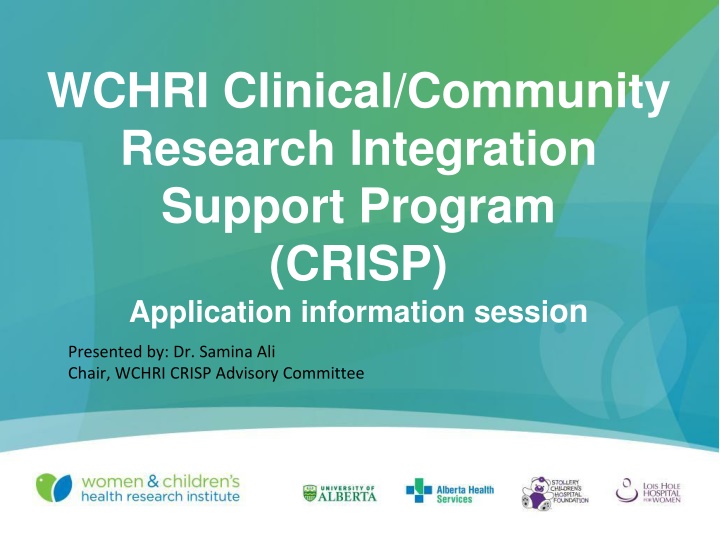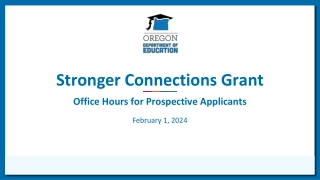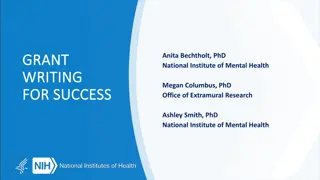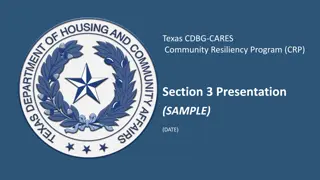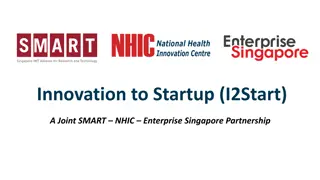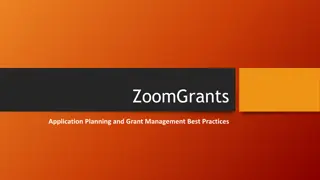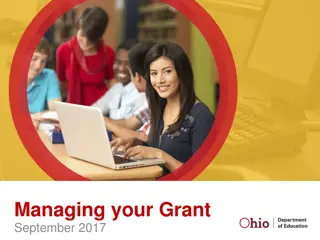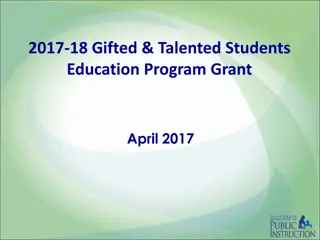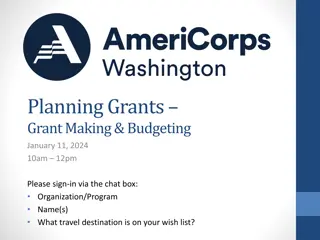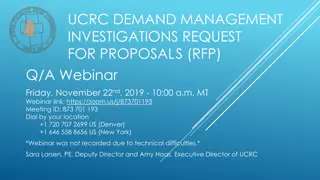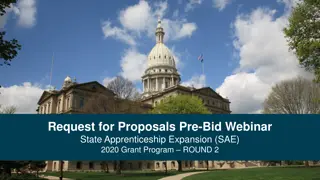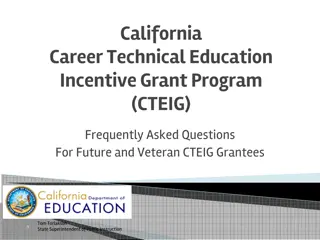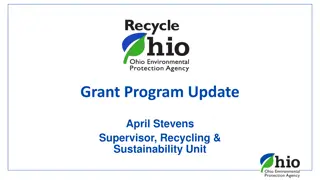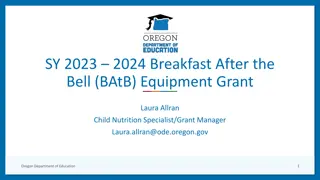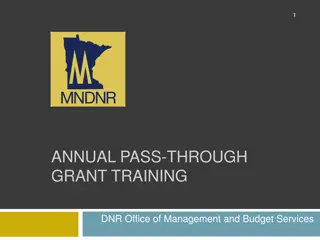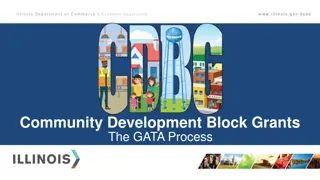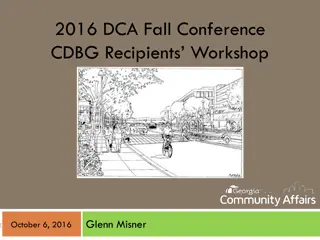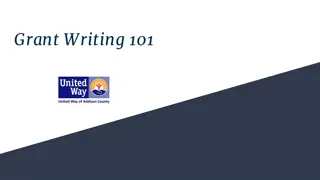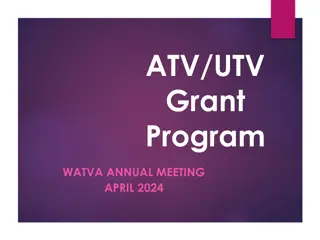WCHRI CRISP Grant Program Information Session
WCHRI CRISP Grant Program offers up to $20,000 in operating funds over 36 months to support collaborative research focusing on improving health outcomes for women and children. Eligibility criteria include human subjects research and academic membership requirements.
Download Presentation

Please find below an Image/Link to download the presentation.
The content on the website is provided AS IS for your information and personal use only. It may not be sold, licensed, or shared on other websites without obtaining consent from the author.If you encounter any issues during the download, it is possible that the publisher has removed the file from their server.
You are allowed to download the files provided on this website for personal or commercial use, subject to the condition that they are used lawfully. All files are the property of their respective owners.
The content on the website is provided AS IS for your information and personal use only. It may not be sold, licensed, or shared on other websites without obtaining consent from the author.
E N D
Presentation Transcript
WCHRI Clinical/Community Research Integration Support Program (CRISP) Application information session Presented by: Dr. Samina Ali Chair, WCHRI CRISP Advisory Committee
WCHRI CRISP Grant Program Program purpose Seeks to support collaborative research with patient or community populations that have the potential to: Improve clinical/ community health outcomes and/or influence clinical practice at the point of care for women and/or children Enhance research excellence and capacity in investigator-initiated clinical/community research studies, and Support the development of evidence-informed practice to improve health outcomes for women and/or children
WCHRI CRISP Grant Program Up to $20,000 in operating funds over 36 months Projects must align with WCHRI strategic roadmap and meet WCHRI relevance criteria Since 2016, WCHRI has funded just over 60% of applications reviewed by committee Application deadline: September 4, 2020 (4:00pm) Applicant question (drop-in) session: August 21, 2020 (2:00pm-4:00 pm) Application outcomes: November 27, 2020
Eligibility Restricted to projects that require human subjects (HREB) ethics approval. Principal investigators must be WCHRI academic member for not less than one year prior to application, except new recruits with an academic appointment of less than one year at time of application to WCHRI. must hold a faculty appointment at the U of A (academic or clinical), where the PI is eligible to apply and hold funding according to UAPPOL may submit one application per cycle; past awardees may not re-apply to the program for 2 years from the date of implementation on the previous award.
Eligibility A research mentor is required as part of the team where the principal investigator has less than 40% time protection A research mentor must hold a full-time continuing academic appointment and be a WCHRI academic member deferral policy access to one grant only, deferred start/implementation and satisfactory progress; extension limitation
Team composition Team member roles must be included in the proposal Collaborators provide a letter of collaboration that details engagement in the research and what their role is Letters of support are not accepted Team composition may not include staff (ie research coordination) or commitments made directly by research coordinators to research.
Team composition Each team member should have a specific role and bring expertise that is unique to them to drive the section of the work they are committed to completing. Team members may not benefit financially from the grant.
Team composition The applicant or principal investigator Has a great research question!! A principal investigator is responsible for the proposed work and, while supported by the team, is responsible for the intellectual direction of the research activities. Of the proposed team members, the research most closely aligns with the principal investigator s academic interests and activities.
Team composition Mentorship Everyone benefits in mentorship Everyone can use help, support and encouragement!! A mentor should be engaged and committed to ensuring that the project design is feasible, that methods are sufficient and well-supported and that limitations are addressed. Most applicants to this competition do not have significant research time protection and dealing with obstacles especially institutional ones, can be time consuming! DoP applicants: contact Dr. Gary Lopaschuk, no later than July 31, 2020.
Team composition Co-investigators (maximum 4) A co-investigator helps the principal investigator do parts of the research that they have specific expertise in the co-investigator makes intellectual contributions to the project maintains a commitment to the project throughout the course of the work and works with the principal investigator to achieve research outcomes It should be evident to committee the proposed work aligns most closely with academic and research activities that the principal applicant is engaged in. The role of principal investigator and co-investigator are not interchangeable.
Team composition Collaborators (maximum 3) A collaborator provides access to or does a specific part of the work a collaborator does not commit to participate to the entirety of the research - their commitment is limited within the research project. For the CRISP program a collaborator most often commits services, personnel and/or assess to clinical supports and or provide patient access. Where a collaborator makes a commitment this commitment may not be claimed/listed in the budget.
Letters of Collaboration one letter per collaborator must clearly detail each collaborator s role or contribution letters must be signed, dated and on letterhead
Team composition Stakeholder (required 1) Work with a stakeholder to build a relationship that affects change through research create meaningful relationships with a partner in research, create potential for more relevant research; support an ethical mandate to open and democratic research processes; improve translation of research results into practice and policy-making. Stakeholders may provide a letter of engagement; where budget is committed by a stakeholder it should be reflected in the letter of stakeholder engagement.
WCHRI Research support platforms All applicants are encouraged to contact WCHRI qualitative research and patient and community engagement core for support with: research design and methodology patient enrollment and retention stakeholder engagement knowledge translation plan This support is (free and) intended to help ensure that applications are scientifically robust and meet the program mandate (and therefore do better at committee review).
WCHRI Research support platforms WCHRI offers a number of research support platforms that may be available to our members at preferred rates. For more information and to access any of our services, complete the research support request form. These platforms include (but are not limited to): biostatistics, data coordination centre (REDCap), clinical research core For more information and access to any of our services, complete the research support request form
Priority Call in Mental Health WCHRI has committed one award to support research in the area of women and/or children s mental health. The application process for these funds remains the same as for other applications.
Grants submission portal https://www.wchri.org/grants-submission-portal WCHRI academic membership limitation The principal investigator must be a WCHRI academic member for not less than 1 year prior to application; exception: new recruits with an academic appointment of less than 1 year at time of application deadline.
CRISP Review structure Applications are reviewed by both scientific and community review committees. Peer review criteria are available on the WCHRI website
CRISP Review structure Peer review criteria Quality of the research team (10 point maximum) Quality of the proposed research (20 point maximum) - Quality of the research question - Quality of the research plan, design and methodology Assessment of the knowledge translation plan (20 point maximum) Total score maximum: 50
CRISP Review structure Community review committee is composed of community reviewers that are interested in participating in research and have an interest in women and/ or children s health and well-being. Since the 2018, the community review committee has provided feedback to the scientific committee for their consideration in scoring. Effective the 2020 competition, we expect that the community review committee will provide a consolidated recommendation to the peer review committee.
CRISP Review structure Community review committee are asked: How would you describe the nature and the quality of the stakeholder engagement? Is the stakeholder engagement described in sufficient detail? Does the stakeholder play a meaningful/active role in the research? Do you feel that the stakeholder involvement is sincere and genuine? Do you think there is the right match between the needs/interests of the stakeholder and the research topic/research outcomes? )
CRISP Review structure Community review committee are asked: With reference to the "knowledge translation plan" what is your opinion of the researchers' plan for sharing the research results with the key stakeholder(s)? Is the stakeholder actively involved in the knowledge translation planning and organization? Do you see a potential for improving the clinical care and/or improving the wellbeing of women and children (patients, caregivers, community members) ?
CRISP Review structure Community review committee assesses the following: Overall, do you see this project as relevant/important for the health and well being of the women and/or children in our community?
Committee composition Committees are broadly composed and based on application volume. Do not expect an expert reviewer exactly in your field of research Avoid jargon/ specific scientific language
Relevance Criteria WCHRI does not fund research that does not align with our relevance criteria regardless of scientific merit The responsibility of evidencing alignment is the applicant s Where the application, is not clear or does not (clearly) support application relevance to WCHRI, committees score applications as low relevance.
Relevance Criteria The research question must specifically target improving outcomes for women and/or children through health research. The primary research question must address the unique and distinct health needs of women and/or children. For example Stating that a particular disease or risk factor is higher in women or in children is not sufficient rationale; the study must explore why prevalence is higher in women or children. If a study is exploring sex/gender comparisons, the comparison must be embedded as the primary research question, not as a secondary outcome. Methodology must clearly demonstrate direct applicability to women and/or children s health outcomes. The applicant must provide rationale for their chosen research model, including factors such as sex and age. The above items are some common considerations; alternative or additional factors may need to be included depending upon the proposed research.
Preparing your application Read the application and guidelines Allocate sufficient time to obtain institutional support (submit the application for RSO) Ensure you and your mentor and research team proofread the entire application.
Lay summary A lay summary is a brief non-scientific summary of your research - written in simple terms for non-experts (grade 8 level). Why it s important Raises awareness and encourages interest Promotes your research activities to our foundations and the public Fulfills grant requirements
Work Plan Think about feasibility and how the work process will flow consider timelines for recruitment, data collection etc. be realistic and clear! be sure to include outputs (presentations, publications, etc.)
Project development Consider What are your hypotheses/research questions? Why is your research/project important? significant? novel? Potential / immediate / future application(s)? Do you plan on using quantitative methods? qualitative methods? Mixed methods? Have you discussed with a methodology expert? Will you be undertaking experimental research? Clinical research? Community?
Typical project organization Background - about 1/3 of proposal: statement of the problem/focus (one/two sentences) background and significance: current state of knowledge, and gaps short and long-term objectives hypothesis/research questions progress / preliminary studies if possible
Typical project organization Proposal itself - 2/3 of proposal: research design and methods characterize sample (cells or people) data analysis clearly describe the role of all team members timelines strengths and weaknesses
Knowledge Translation Plan Knowledge translation activities and plan are worth 40% of the total score, include: a KT plan that details the anticipated outcomes and impact details on knowledge users, how they will be involved in study or KT process next steps (change in practice of care pathway, preclinical or clinical development, impacts on health policy)
Writing the Budget make sure the budget is justified quotes may be included!! do not request items that are not allowed KT is worth 40% of the scoring allocation consider KT outcomes and promotion in your budget
Top 3 committee discussion points Feasibility - Can the work be done in the timeframe allowed with the budget available? Methods - Does the research support the question? Will the outcome flow from the methodology? Team Qualifications - Are the investigators qualified? Does the team have appropriate expertise, credentials and experience?
Grants submission portal Applications must be submitted through the grants portal We do not accept applications submitted by email or brought into the office (ie paper). Do not bring material to the WCHRI office - it is closed. You will need to build your application PDF. Refer to the website program page for instructions on how to PDF your application. System maintenance Portal access closes immediately at/ after the deadline (ie 4:01 pm). If you have not uploaded your file by 4:00 the system will not accept the file upload.
Closing Comments you are responsible for your fundability ask for clarification (if necessary) you have some very good resources at this university start with your colleagues or research mentor
Applicants are invited to contact WCHRI Research Grants Administration or WCHRI Research Grants Administrator Michelle Bailleux
